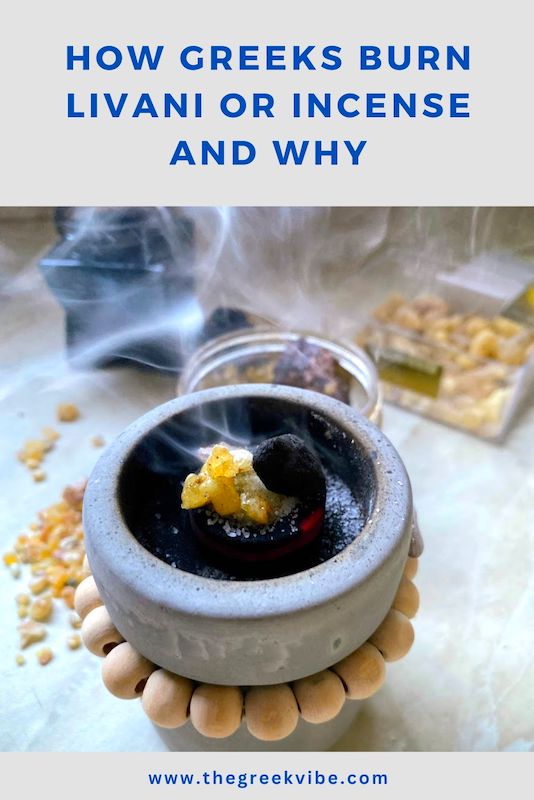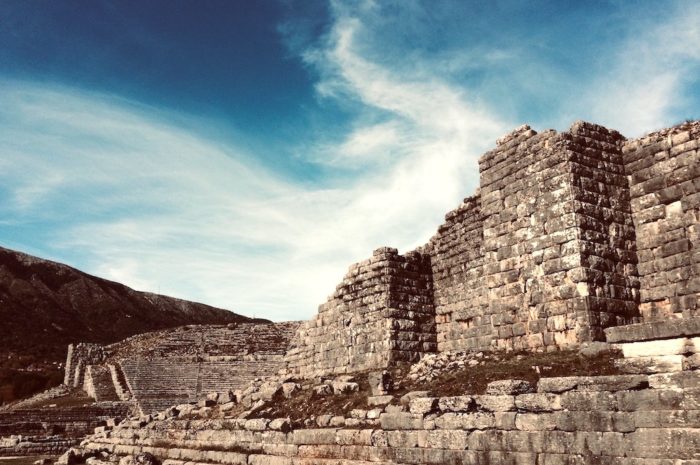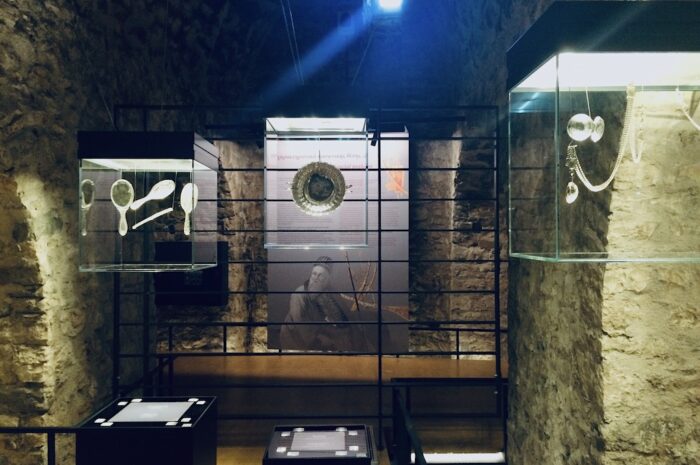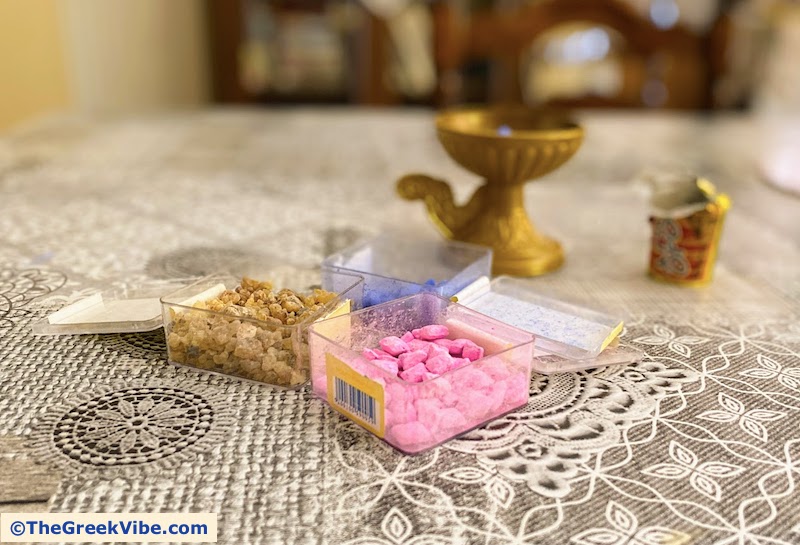
We have all have at some point in our lives passed by a Greek Orthodox church only to be enraptured by the strong aroma of “livani”, or in English, incense, but how do Greeks use incense, what does it symbolize and why are many returning to this ancient ritual?
Burning incense or “thymiatizo” in Greek comes from the word “thymiato” which derives from the word “thymiama” meaning any material that releases a beautiful fragrance.
The word “livani” goes back to the Arabic “lubban”, describing a sweet-smelling resin derived from the Boswellia tree found in Yemen, Oman, Sudan, Ethiopia and Somalia.
👉🏼 Find the best hotel deals for you
‘Thymiatizo’ or Burning Incense in the Greek Home
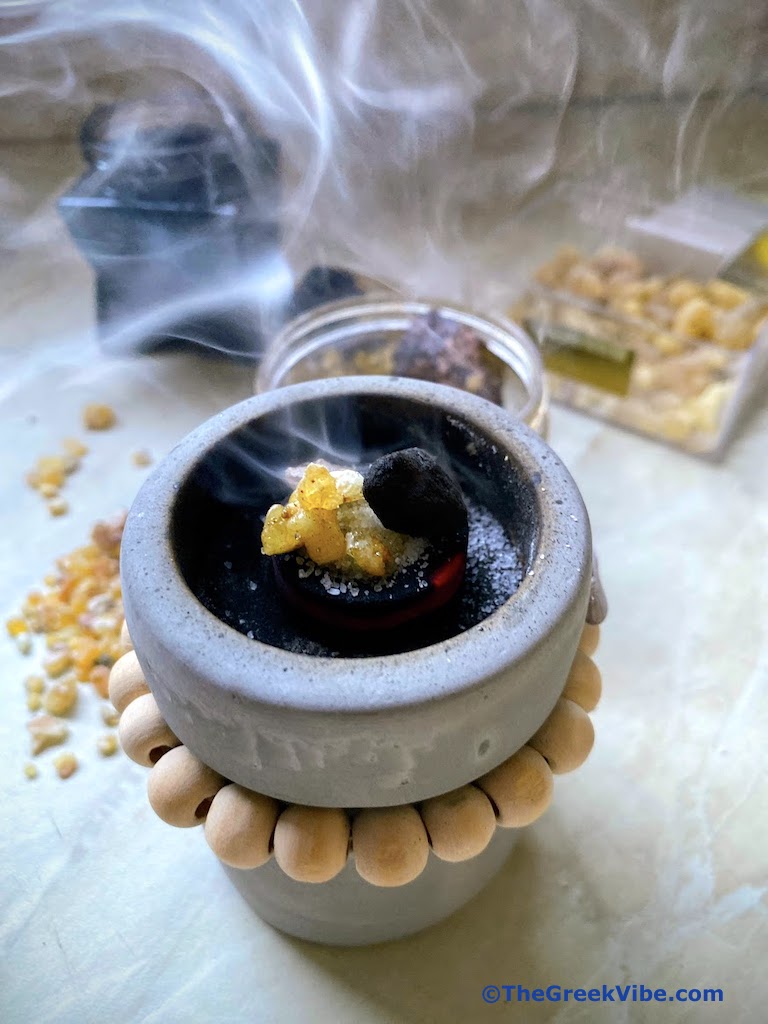
In Greece, burning incense or “livanizo” (the verb) goes hand in hand with lighting the “kantilaki”, the special vigil oil lamp which every Greek household had up until fairly recently.
This oil lamp which could be a simple glass base with cover or an ornate bronze hanging variety, or both, could be found in a special corner of the home where icons given as gifts or purchased on trips are kept. These icons are usually of patron saints whose names have been given to the people in the home.
This ‘personal’ Orthodox shrine of sorts known as the “iconostasi” (literally the “station for icons”) was where all the sharing, asking, repenting, dreaming and believing would take place.
I remember my grandmother dutifully first lighting the kantilaki on Sunday morning and then lighting the livani, which she would then take from room to room to bless the house. To be honest, as a child I used to hate this practice and felt overwhelmed by the strong smell of the livani.
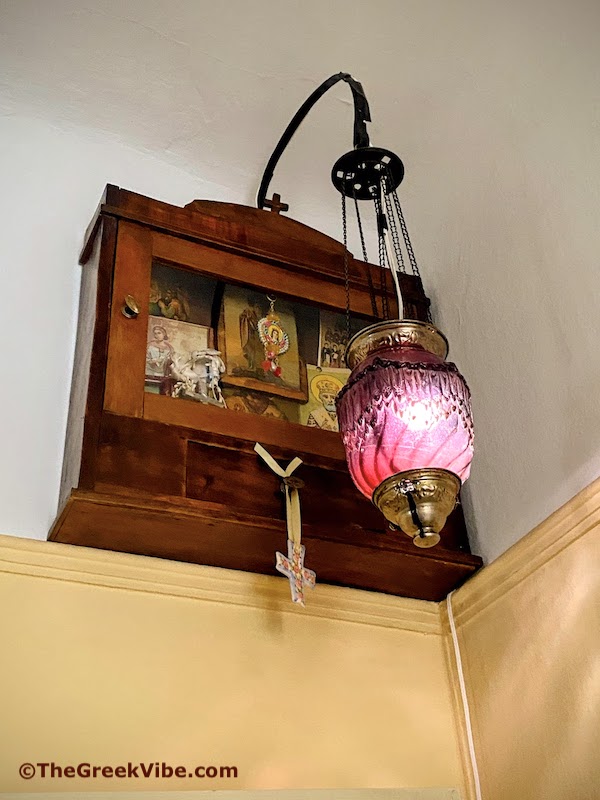
Still today, every night before my father goes to bed, he too lights the kantilaki. He’s actually gone as far as to modernize (for safety and ease) our hanging vigil lamp – part of a precious wooden heirloom passed on to him by his parents in 1935 – adding a small electric bulb to it! But he still lights the kantilaki on the table underneath, says a prayer before he goes to sleep.
In Chicago as a child, I remember thanking God for my parents and family, asking the Divine One to protect us all and to make sure I was good child – all this by the makeshift iconostasis. However, although the majority of second-generation and onward Greek-Americans, Greek-Australians, Greek-Canadians and Greeks anywhere in the world have grown up with the iconostasis in our homes and childhoods, very few of us know what it means and why our grandparents and parents would burn incense (livani) every Sunday.
I could dare to say that even modern-day Greeks living in Greece don’t know.
And in all honesty, it took me years and age to finally understand the meaning of this ritual and to make it a part of my own regular routine.
What is Thymiama or Livani?
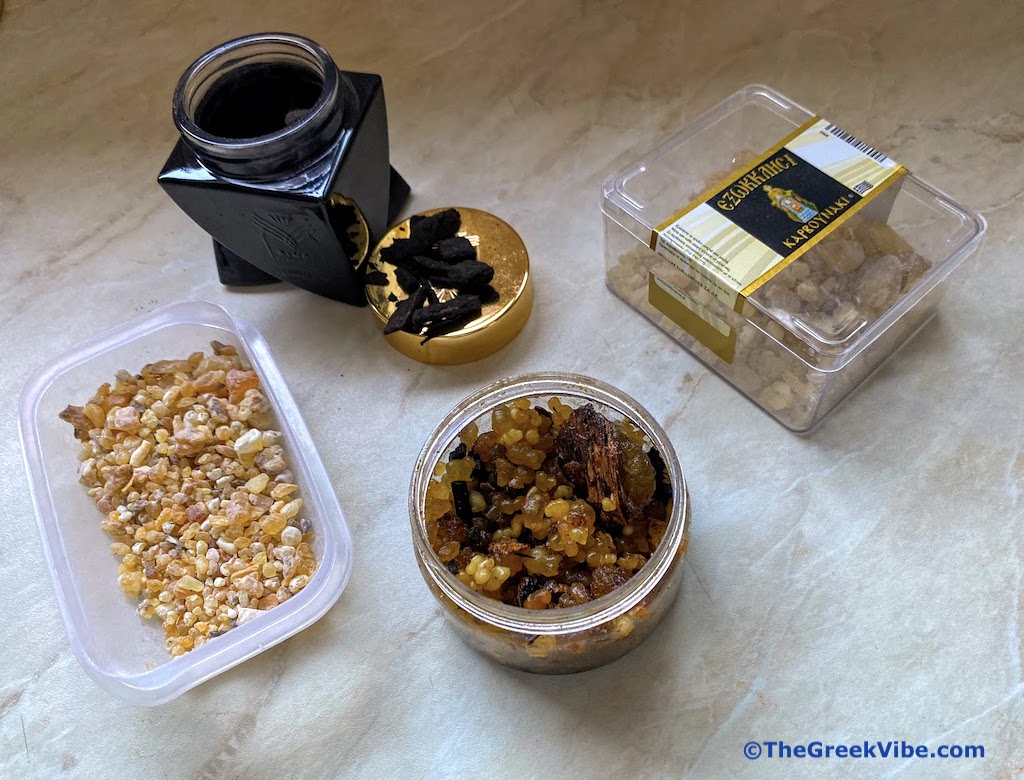
Thymiama or livani is a raw form of incense which releases a fragrance when burned. Raw incense is usually made of some form of natural material which could be a local mineral, herb, wood from certain trees, a resin or plant part. Today essential oils are added.
Incense comes from the Latin word “incendere” which means ‘to burn’. In the Western world we know more of myrrh and frankincense, but in the Middle East, there is the extraordinary “Bakhoor” often imbued with otherworldly oud oils which is an absolute wonder.
Actual incense, not the stick variety, is collected very much like mastic is on Chios island. A cut is made into the trunks of select trees and the droplets or resin is collected and then enhanced with essential oils and dried as pellets.
►Visit Meteora and Reach Out to the Universe
Livani: The History
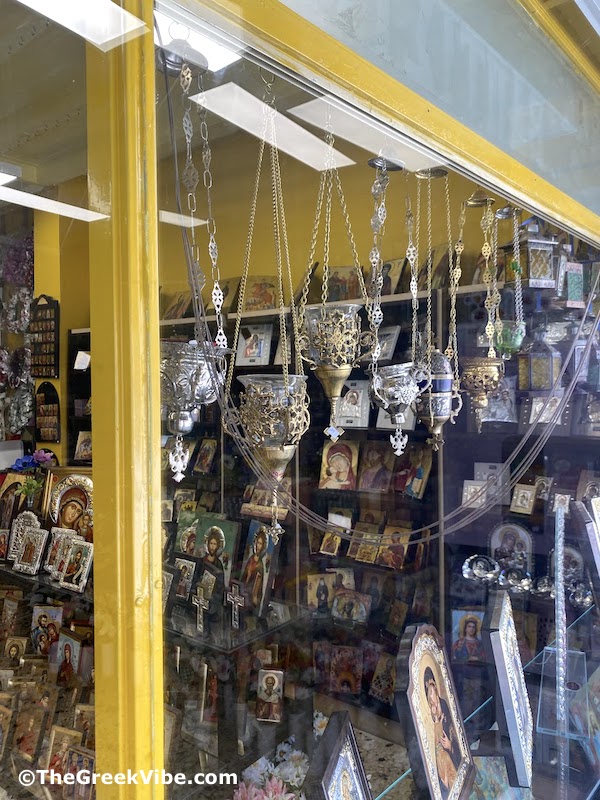
For thousands of years, Greeks and all ancient peoples used incense in their life practices as aromatherapy, insect repellent or even as an aphrodisiac, they also used it in religious rituals, meditation and prayer.
The Ancient Greeks, who used incense as part of their offering to the gods and later to the single God, also used it at the Asclepions, ancient healing centers in special locations as part of the healing process. More about that here.
The Ancient Egyptians used the pleasant scent of incense to cover up bad smells, to embalm, as an offering to the gods or to drive away demons.
As medicine it was used in Ancient India some 3,000 years ago as recorded in the Vedas, the Ancient Indian religious texts in Sanskrit, and today is a main part of Ayurvedic treatments.
In 14th-century Japan, samurai warriors believed that if they aromatized their helmets and armor with incense, they would be invincible.
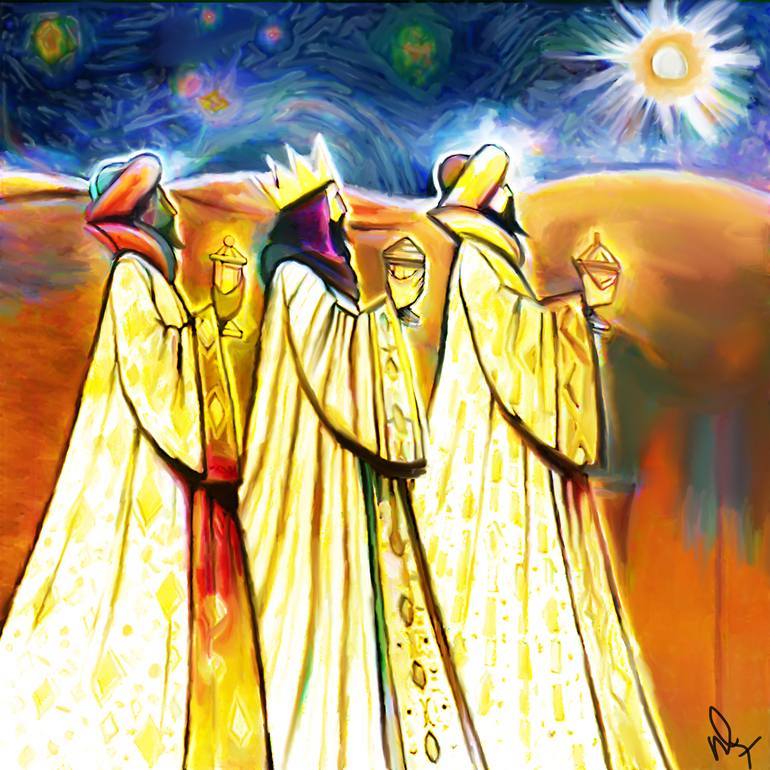
And of course, incense-burning is a very central part of rituals, offerings, festivals and daily life in all Asian countries and religions.
The first time I realized the value of this natural wonder was when I first smelled myrrh, the true myrrh in a candle from the Holy Land. And then again, last year when I received as a present – the best ever – oud and incense from Jordan and Saudi Arabia. Then and there, and this is no exaggeration, I understood why myrrh and frankincense were two of the three gifts (the third was gold) offered to baby Jesus by the Three Wise Men (the Magi) on the day of his birth in Bethlehem. They were rare and precious and carried special meaning.
👉🏼 Find the best hotel deals for you
Where Do Greeks Use Livani
In addition to the weekly ritual at homes, livani is used at Greek Orthodox church services, on name days and other Orthodox celebrations. According to tradition, we should use livani as a form of prayer and gratitude twice a day: in the morning for a peaceful day ahead and in the evening for a peaceful sleep.
►Koliva: The Symbolism of a Greek Delicacy Made for the Dead
The Things You Need to Burn Livani (Incense)
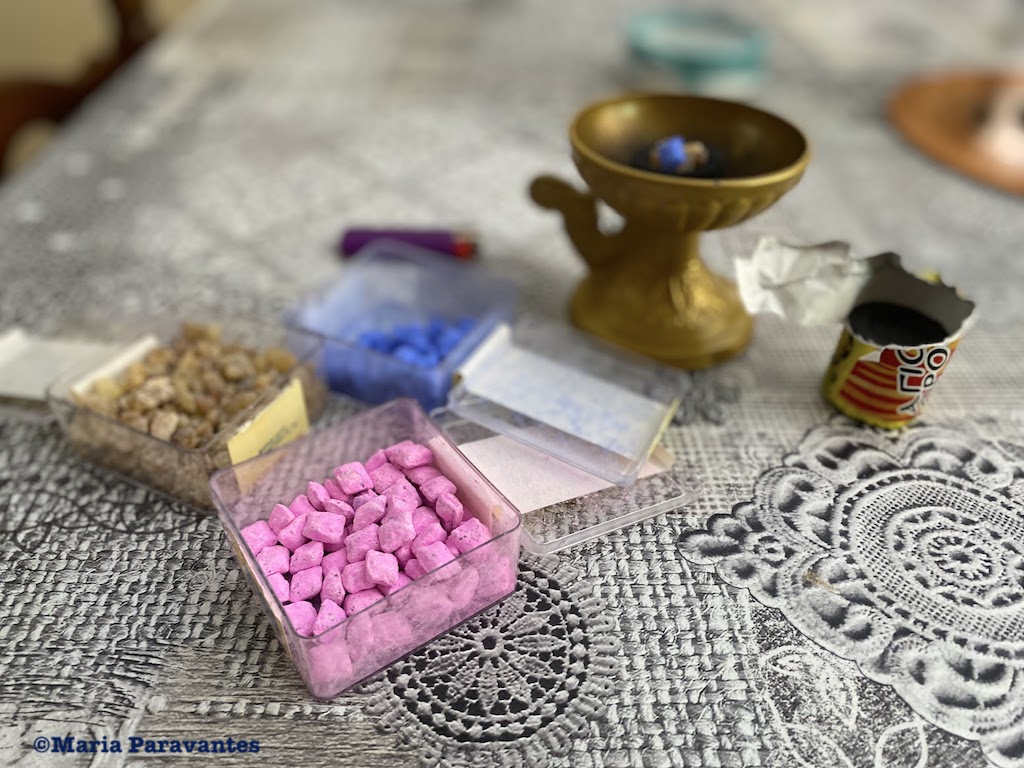
First of foremost, burning incense in Greece is no simple matter, it’s a cleansing ritual and as such you must be prepared to dedicate time and patience. Consider it a moment of meditation.
1. A “livanistiri” or censer – usually a bronze vessel made for burning incense or an incense burner. Like I mentioned above, you could find all sorts of livanistiria or censors: small, large, fancy, simple, silver or gold, table top or hanging, carved or plain. The thurible is what the priest uses during Orthodox services but there are also swinging varieties from the ceiling.
2. Charcoals or “karvounakia” in Greek. There are dozens of varieties. Some an absolute waste of your money. They should burn slowly once lit. This is a tried and tested product.
3. Livani or incense resins (gums or grains). The quality of livani is of utmost importance. If you visit Greece, you can find good quality livania at monasteries. The monks at Mt Athos and at the monasteries of Meteora also make and sell all kinds of livania with various aromas including gardenia, frankincense or “moscholivano”, jasmine, lavender, rose, and myrrh.
You can also find all the things you need at this tiny shop in Monastiraki called Barba Haralambos which has been selling all things related to incense and spirituality since 1923!
4. a lighter
5. tongs – not necessary but helpful. This beautiful incense burning set comes complete with tongs.
►You Can Still Visit the Ancient Wellness Centers of Greece
How Greeks Burn Livani in the Home
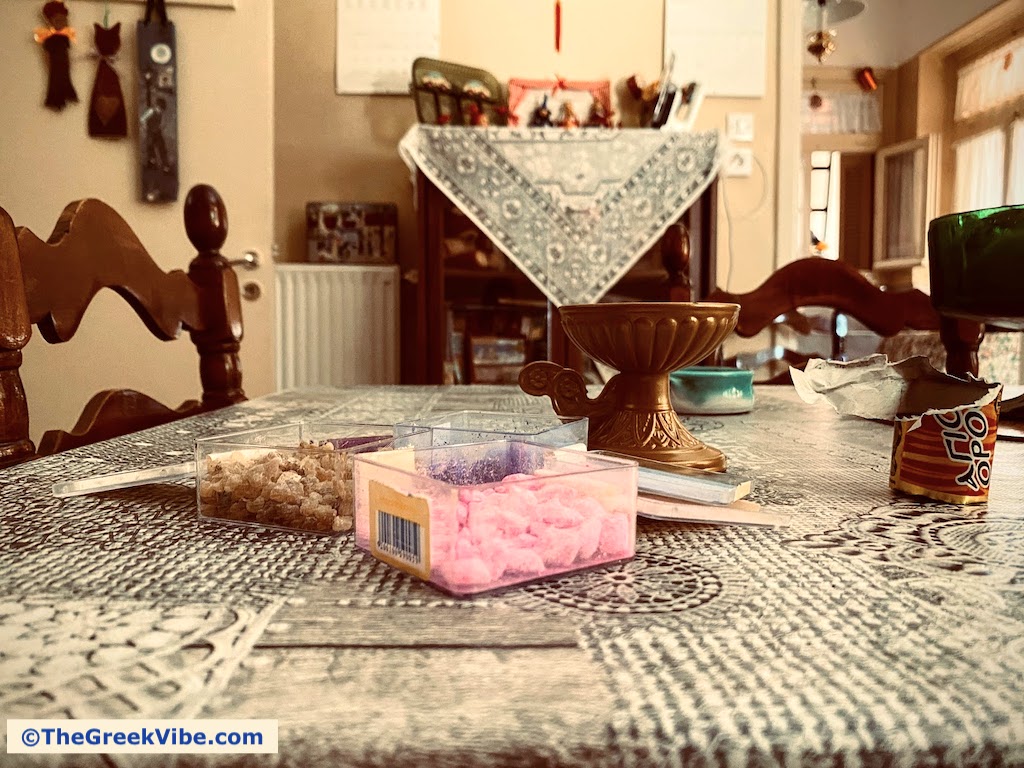
1. Clean your censer or livanistiri (you could dress with aluminum foil if you want).
2. Take out a coal and light it with a match or lighter all around. You’ll hear it make a sizzling sound.
3. Wait for a few seconds and using the tongs place the karvounaki (coal) in the censer and wait until it turns greyish.
4. Add some salt on top for a slow burn and then place two or three livani gums on top of the burning coal.
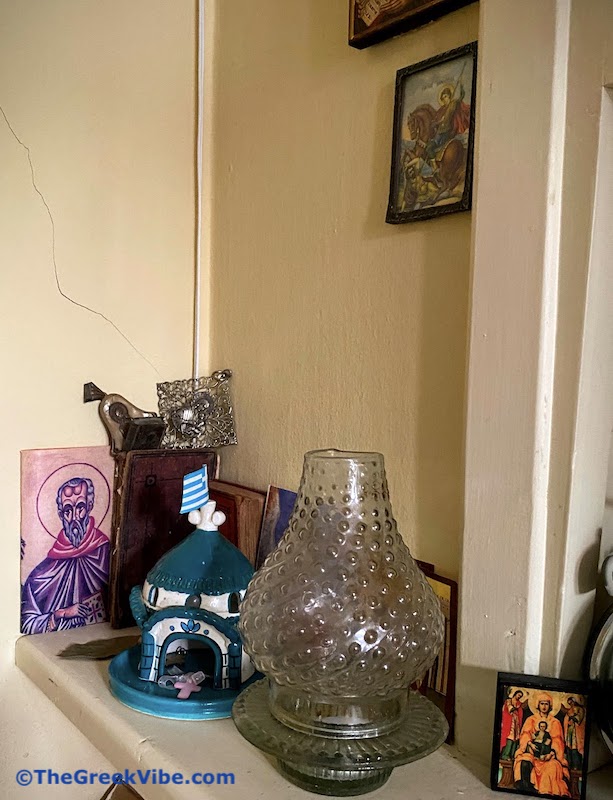
5. Take the livanistiri by its handle and start from your iconostasi (if you have one). Then, move from one room to the next bringing fragrance to the entire living space. The more devout say a prayer while doing so but in short you could ask whatever higher power you believe in to bless the home and its dwellers and to clear away all negative energy.
6. Lastly, pass the livanistiri over the front door for protection, luck and good health. My grandparents made a symbol of the cross but this is not necessary.
7. Place the censer on the table and go on with your daily routine as you enjoy the soothing aroma.
8. Always store your livani or incense in a tightly closed jar in a cool and dry place.
9. Have in mind that fine incense must be burned in this way otherwise you will not get the full effect.
10. Buying good quality incense and charcoals can make or break the whole livani experience.
►Greek Evil Eye: 6 Tips to Avert the 🧿 ‘Mati’
Buying Livani – What to Know
Not all incense (livania) are equal and the same applies to charcoals. Poor quality of either will deprive you of the full effect.
Avoid buying incense from mass production or dollar stores. if you’re in Greece, prefer handmade organic livania sold at Greek monasteries and at Mount Athos. Or order tried and trusted products such as these made from the monks at Mt Athos: Holy Night incense, rose-scented livani, amber incense, jasmine incense, and cypress tree incense.
👉🏼 Dream of visiting Greece? Start planning
The Livani Experience Today
As more and more people realize the importance of well-being and balance, cleansing practices have begun to take on a whole new meaning. The very fact that someone dedicates time to bringing sweet scents into their living space means that they have already chosen to be on a higher vibrational level and to focus on something positive even if that’s only for a few minutes. You’d be surprised how much can change with just a few minutes of positive thinking.
If, however, all this is mumbo jumbo to you. I get it. Then simply enjoy a beautifully fragrant house.
And lastly, for those of us seeking connection with our past, livani not only recreates childhood memories but inspires us to search for meaning in things our parents and grandparents did, bringing those practices into our lives today in our own very special way.
🔹
*The Greek Vibe may receive commissions on purchases made through affiliates and partner links. Clicking affiliate or partner links comes at no additional cost to you but goes a long way in supporting our work.
♫ I end today’s post with a rebetiko song written in 1930 by Bayianteras (aka Dimitris Gogos) and performed by Michalis Genitsaris, two greats of the Greek blues genre. The singer asks that “livania” be lit instead of candles at his death. In this case, “livania” means the narghile or hookah. “Light up the shisha and drown me in the smoke,” he says.
Enjoy!
Enjoyed this Post? Share and Pin it!
